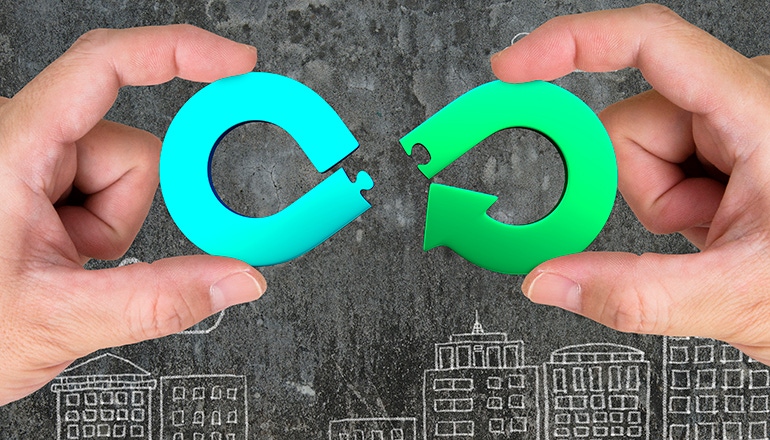The future of the circular economy is bright, and the way we think about waste and recycling is about to change.

Recently, the world celebrated Global Recycling Day, our annual reminder that the way we’re living can’t be sustained indefinitely, unless we embrace a new path to national and international resource efficiency.
The theme of Global Recycling Day 2019 was “Recycling into the Future,” with an eye to encouraging countries around the world to look toward the future impact young people and technological advancements can have on our worldwide recycling efforts. China’s decision to ban the import of several categories of recyclable waste, as well as India’s more looming decision to possibly ban plastic imports, means these recycling efforts are needed now more than ever.
The number one complaint I hear on an almost daily basis when it comes to recycling and sustainability is from people who, through no fault of their own, struggle to know what to recycle. Does their city allow mixed recyclables, or must they recycle by category? Must they clean everything they recycle, or can they get away with not fully rinsing out their milk cartons and yogurt pots? And what’s the deal, they ask, with differentiating between hard and soft plastics?
We all want to be good global citizens, we really do. But it often feels that the path to getting there is an uphill struggle.
The Circular Economy
The circular economy looks to prevent depletion of finite natural resources out of the global economy in order to better use the natural resources we’ve already extracted to extend their useful lives. Recycling is the gateway to greater sustainability in the circular economy. It encompasses both upcycling, whereby a material is repurposed into something of higher value or function, such as turning used plastic into fiber for clothing; and downcycling, whereby a material is repurposed into something of lower value, or it is returned to its component parts, such as taking used cardboard and making it into a new cardboard box.
The circular economy compels us to rethink our standard ideas around how consumption works. The typical way consumption is thought of is we take finite natural resources, we use them to create a product, then we throw said product away after we’re done with it. When you add recycling into the mix, this equation starts to sound more forgiving, but it’s still not living up to its full potential.
While learning how your city recycles in order to reduce food contamination and maximize the productive afterlife of anything you place in your green or blue bins is a worthy use of your time, an even better use is to rethink conventional ideas surrounding consumption. Recycling is the foundational process of the circular economy. When we evaluate our purchases with greater scrutiny, or we reward companies that take a sustainable approach to business (and we encourage those that don’t to change their ways), we are rethinking our relationship with our future waste.
The future of the circular economy is bright. With technology innovating in this space at an ever-increasing rate, the way we think about waste and recycling is about to change.
David Rachelson is vice president of sustainability at Rubicon Global, a technology company that powers a digital marketplace, provides a suite of SaaS products for waste, recycling and smart city solutions and collects and analyzes data for businesses and governments worldwide.
About the Author(s)
You May Also Like


